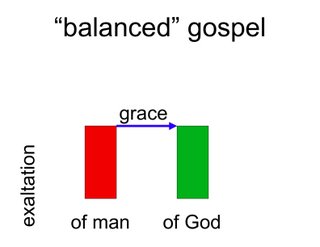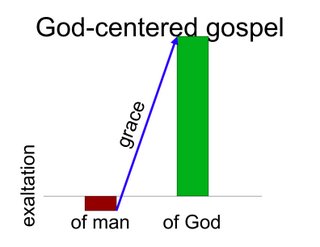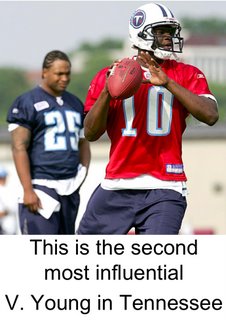Last week, I had the opportunity to survey some people practically in my backyard. I've posted the survey results, both
statistical and
testimonial. But there are other observations I'd like to share.
Evangelism
I've made the same excuse in my head before to keep from doing "survey-type evangelism" at public events...
God wants me to reach my neighbor, family member or friend I know. Evangelism with total strangers isn't really that hard. Then, I would continue to sit on my couch, not reaching my neighbor or the stranger walking by. Do I think I am totally fulfilling the Great Commission if I place tracts in public bathrooms, hand them to waiters and confront total strangers at events? No, God also desires for me to proclaim the gospel boldly, both in my front lawn and behind the pulpit. But I have to ask a second question:
I may not be fulfilling all of the Great Commission by passing out tracts or doing surveys, but am I fulfilling less of it if I don't? The answer: yes. Frankly, it is easier to talk to the stranger. Somehow, I let the fact that it is easier (and the fact that I haven't been as bold with our neighbors as I should) prevent me from doing any evangelism. I somehow easily get deceived into thinking God will make me an evangelist first, and then I will evangelize. Yet, the pattern seems to be that the one who evangelizes is an evangelist! Here has been the very slow, pathetic transformation in my life in the last four months:
I bought some tracts. (They sat on my desk for a while)
I started carrying tracts. (They sat in my wallet for quite a while)
I started leaving tracts in my trail. (I'd set them out in places to be found, but without my having to interact with anyone)
I did some surveying. (I entered gospel conversations with people that were planned)
I passed out tracts. (Typically after the conversation)
I start handing service people (waiters, hairdressers, guy at Staples) tracts.
I noticed that the guy delivering our couch makes a comment about coffins. I actually try to get a conversation about death started, seeking his words as a transition.
I am aching for our neighbor across the street and daily looking for an opportunity to speak to him. (Guests at his house have made that difficult to this point.)
I'm tired of waiting until I feel like this robust evangelist. I want to start sowing and let Him take care of the harvest.
Law in Evangelism
During BNYC, a faithful brother in our fellowship introduced Ray Comfort and
Way of the Master as
a way of doing evangelism. I have to disagree. As I read the Scriptures, it appears to be
the way of doing evangelism. When Paul summarized the gospel in I Corinthians 15:1-6, he says it was
for our sins that Christ died. Any "evangelism" that doesn't deal with man's sin and Christ as the atonement is a
complete dog's breakfast.
I've felt that strain before. I try to make Jesus look so attractive to someone. I stab at joy, but they aren't biting. I mention purpose, but they don't care. I threaten with hell, but they feel invincible and are convinced God doesn't want to punish them. Yet, I took God's law before them, and it was different. Several times, a person went from jovial to concerned before we finished going through a couple of commandments. Only a few were still light-hearted when I finally asked if they would be innocent or guilty on the Day of Judgment. It really got to issues of the heart better than anything else I've seen. (I had done this before in preaching or conversations with people I knew. I was shocked at how well it worked with total strangers. We were talking about their sin and hell and that they deserved hell, yet I think they could all tell that I truly cared for them.)
But You Didn't Seal the Deal
Each night, I went out with one goal in mind: "To glorify God in the proclamation of His gospel." God granted me the privilege of doing just that. I did not go out with the goal (I had the desire, but not the primary goal) "to save" people. It was important for me to make this distinction before I went out for the following reasons:
Preserves the message. If a preacher presents the gospel properly to a group of hard hearted people with whom the Spirit of God is not engaging, his message will not be received. Therefore, if the preacher looks at the lack of results and determines he must change his message, we lose Romans 10 and the gospel is not preached. I can't control a person's response, therefore I should not change the message under the assumption that I can control them.
Redefines success. Closely related, is the thought that success is only found when a conversion takes place. The problems with this perspective are... a) Converts can be counted as MY success. b) A lack of success can lead to changing the gospel to get better results. c) A lack of success can lead to believing I have failed and therefore must not be an "evangelist." Therefore, I neglect the work we were all called to do.
However, if success is gauged by accurately and lovingly presenting the gospel, thus glorifying God, here are the results: a) I worship in the process. I am not reciting a sales pitch but revealing a glorious God. b) Any fruit, including the accurate presentation of the gospel, can not be credited to anyone but God. c) We do not depend on the response of others to determine our Savior's pleasure in us.
0% False Conversion Rate. By preventing myself of leading a person in a prayer, or asking them to pronounce their faith on the spot, no lost person walked away believing they were saved. Of the 66 people who talked to me, I would say I easily could have led 15 of them in a prayer at the end. But even while doing that, I would have doubted that all 15 were truly repenting and trusting Christ alone. Could I have given someone eternal hope that shouldn't have any? Quite possibly.
But what of the person what was ready to repent and trust Christ? You just let them walk away! Isn't a few false converts worth the price of making sure we don't let one get away? I've been asked similar questions to this already. My response, "None get away." If a person would have been willing to pray a prayer declaring their repentance and trust in Christ alone, guess what: They already have repented and trusted Christ! And if they received the message with a broken heart, turning from their ways and have turned to Christ for their salvation, then they won't slide under God's radar. Should God desire I enjoy the privilege of helping in the growth, He will make our paths cross again. Should He desire them to grow in another church, I praise God for the strength added to that church by a true convert walking through their doors.
Bottom line is that our church may not see any numeric growth at all from this. I pray that we are kingdom minded enough to not be bothered by that.
I'm still praying for those who came to an event to eat unhealthy food, ride some rides and waste $5 for a game with a $3 prize and walked away thinking about their sin, God's judgment and God's gracious offer. I may not be gifted in evangelism, but I'm praying this is the beginning of a process to atleast say I act like an evangelist.
 A current trend in evangelism is to bring people to Christ by encouraging them about how special they are. Notice, however, two obvious trends. The exaltation of man automatically limits the amount that God may be exalted. Second, grace actually becomes a condescension, working its way down. One has to ask, Why would I need grace? God would be foolish to not want me.
A current trend in evangelism is to bring people to Christ by encouraging them about how special they are. Notice, however, two obvious trends. The exaltation of man automatically limits the amount that God may be exalted. Second, grace actually becomes a condescension, working its way down. One has to ask, Why would I need grace? God would be foolish to not want me. An attempt to "balance" this perspective has been made by many. We will not exalt man, making him the center of the universe, but we will attempt to leave him in a neutral position. However, even in the person's attention, if they are not made little of, there isn't a great deal of room for God to be made much of. Therefore, notice how grace is shortened. Again, God's grace is diminished as I may see myself as a sinner, but without much being made of God (and much condemnation being made of my sin), I still don't really comprehend why I would ever have been an enemy of God. I'm not really that bad, am I?
An attempt to "balance" this perspective has been made by many. We will not exalt man, making him the center of the universe, but we will attempt to leave him in a neutral position. However, even in the person's attention, if they are not made little of, there isn't a great deal of room for God to be made much of. Therefore, notice how grace is shortened. Again, God's grace is diminished as I may see myself as a sinner, but without much being made of God (and much condemnation being made of my sin), I still don't really comprehend why I would ever have been an enemy of God. I'm not really that bad, am I? But notice what happens when man is not exalted. Actually, when man is presented as the sinful wretch each of us is (contrary to our self-esteem society), God is exalted all the more. Notice how great grace is, as it reaches high above us and is great in length. As I truly see myself as unworthy, I see God as truly merciful, loving and gracious. Much should be made of God, and man should be made low, for then grace is exalted.
But notice what happens when man is not exalted. Actually, when man is presented as the sinful wretch each of us is (contrary to our self-esteem society), God is exalted all the more. Notice how great grace is, as it reaches high above us and is great in length. As I truly see myself as unworthy, I see God as truly merciful, loving and gracious. Much should be made of God, and man should be made low, for then grace is exalted.







